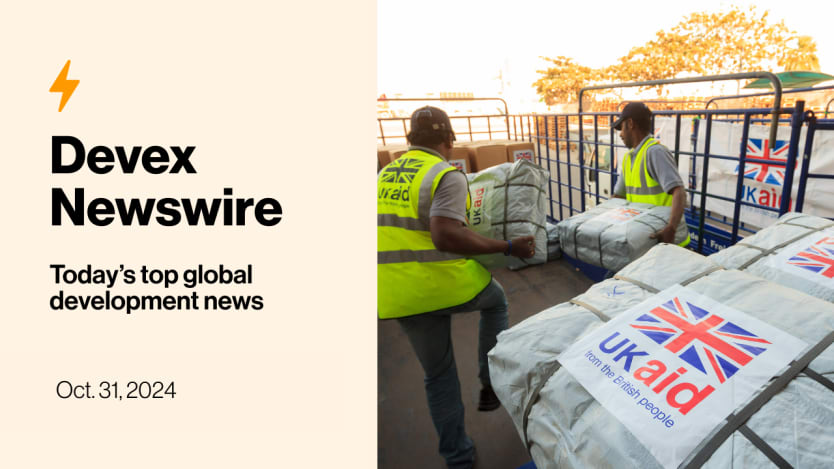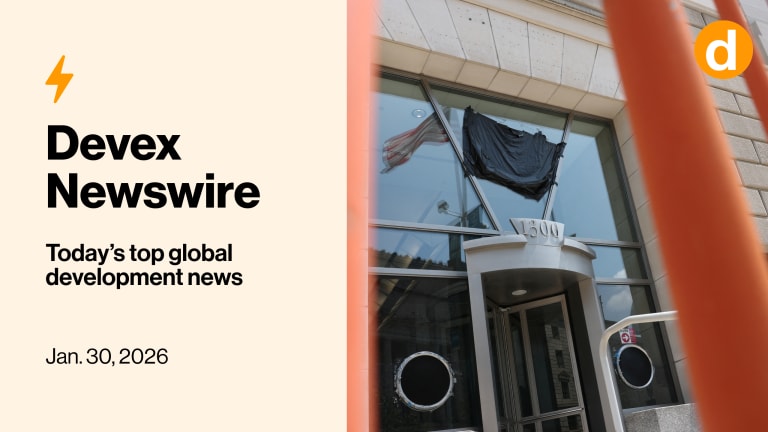
The United Kingdom is set to let development advocates down for a very long time — among them, Bill Gates.
Also in today’s edition: The World Bank’s International Finance Corporation gets chastised by its independent watchdog. Plus, why it’s time to quit the BS around development jobs.
Terribly sorry, old chap
It’s official: 0.5% is here to stay in the U.K., at least for the rest of this decade.
This is a preview of Newswire
Sign up to this newsletter for an inside look at the biggest stories in global development, in your inbox daily.
Those hoping the Brits — under their new Labour government — would return to spending 0.7% of their gross national income on foreign aid will be sorely disappointed.
That disappointment will be compounded by the fact that immediate spending cuts look inevitable, my colleague Rob Merrick writes. Moreover, the government rejected pleas to top up the development budget to offset the billions diverted to pay for hosting asylum-seekers in the U.K., prompting a fresh warning that overseas aid spending will plummet this year.
So what happened?
Labour released its first budget since returning to power, which revealed that the party has abandoned the idea of setting its own economic tests for reversing the 2020 decision to slash aid spending from 0.7% of GNI to 0.5%. Instead, it will stick to the rules set by the previous Conservative government.
Those rules — that debt must fall and taxes must cover day-to-day spending — aren’t going to be met before the start of the 2030-2031 fiscal year.
“By sticking to the previous government’s restrictive fiscal rules for returning to 0.7%, the government not only jeopardizes support for those facing poverty … and climate change, but it also reneges on its promise to return to 0.7% and re-position itself as a reliable development partner ahead of upcoming summits like the G20 and COP29,” Gideon Rabinowitz of Bond tells Devex.
Even billionaire philanthropist Bill Gates had something to say about it: “Today’s budget is a disappointing outcome for the world’s most vulnerable people. Global challenges like climate change and epidemic disease are a shared responsibility with shared consequences, and the UK withdrawing leaves us all at greater risk,” he said in a statement. “I hope to see the UK chart a path back to the commitments that demonstrate this global outlook in action.”
Read: UK aid on track to stay at 0.5% for rest of the decade
Related op-ed: UK chancellor must act in the budget to prevent more aid cuts
ICYMI: UK aid to hit 17-year low with ‘significant new cuts’ feared
+ Check out our page dedicated to coverage of the U.K. aid sector
Emitting hot air
If you can’t accurately measure a problem, can you really fight it?
Apparently, the International Finance Corporation, the private sector arm of the World Bank, has not done a stellar job keeping track of its greenhouse gas emissions, limiting the agency’s ability to fight climate change.
That’s the conclusion of a report by the Compliance Advisor Ombudsman, IFC’s independent watchdog, which says the agency is failing to properly track emissions or consider less-polluting alternatives, among other issues.
A key caveat: CAO says the problem does not revolve around IFC’s climate-focused investments specifically, but how it is calculating, evaluating, and addressing greenhouse gas emissions across the spectrum of projects and sectors it invests in, my colleague Adva Saldinger writes.
In other words, we’re only getting a hazy picture of IFC’s carbon footprint.
For example, IFC typically reports on direct emissions but omits the effects of supply chain emissions. So, IFC might disclose the emissions from electricity used in a pig farm, but not the methane emissions from the animals or from producing and transporting their feed, says Jason Weiner, executive director of Bank Climate Advocates, or BCA. That ends up leaving significant emissions out of the evaluation process and results in potential missed opportunities to mitigate them.
BCA and other civil society groups have been sounding the alarm about this for over a year. The CAO findings seem to validate their warnings.
As Weiner puts it: “Investments are fueling more avoidable GHG emissions, adding to the disaster they’re supposed to be helping prevent.”
Read: IFC watchdog calls on agency to revamp how it treats climate emissions
Graceful exit
Civil society organizations scored another victory with the recent release of IFC’s new policy on how it exits investments — guidelines that these organizations have sought for years to ensure the agency does not leave communities in a lurch.
Exiting is a natural part of the investment cycle, but exiting responsibly is the key. That has significant bearing on the potential impact of a project, including the resolution of any environmental or social problems, Adva writes. IFC has come under scrutiny in the past for exiting investments after complaints were filed, seeming to shirk responsibility, and then claiming it no longer had leverage over the project, civil society organizations argue.
The devil will be in the details — i.e., the implementation — but for now, a win is a win.
“Having an actual document that is telling IFC and the world we have to look at some things before we leave and this is what we’re going to do, even as short as this is, we consider it a milestone,” says Carla García Zendejas of the Center for International Environmental Law.
Read: IFC's new ‘responsible exit’ policy — milestone or a missed opportunity?
Changing the narrative
Rutger Bregman is used to making waves. The Dutch historian and author famously lit up Davos in 2019 by calling out rich philanthropists who don’t pay taxes. Now he’s with The School for Moral Ambition — yes, that’s a thing — trying to lure the best and brightest away from lucrative jobs in finance, law, and consultancy to join the world of development and make an actual difference, not just a dollar.
Bregman was recently interviewed by my colleague David Ainsworth in the Pro Lounge of Devex World, where he told David that “we want to help people who are currently stuck in — I think the technical term is — a bullshit job. We want to help them to transition towards a job of high impact.”
“I've always been fascinated by those people who go to a fancy university — take Harvard, for example — but then get a job that doesn't really contribute anything to the world,” Bregman said.
His theory is that people aren’t really in these “pointless” jobs for money. They do them because they’re perceived to be of high status. So we need to redefine what it means to be successful, and persuade people that there’s more status in helping to make the planet a better place.
That means shelling out some bucks to telegraph that a career in the aid sector is worth it.
“One of the problems in this whole do-gooder space is that we’ve convinced ourselves we can’t spend any money on branding, on communication, on overhead, because that’s not the real thing,” he said. “I think that’s utterly misguided.”
Read more: How do we get talented people out of a ‘bullshit job’ and into aid? (Pro)
+ Not yet a Devex Pro member? Start your 15-day free trial today to access all our expert analyses, insider insights, funding data, and exclusive event coverage — including all of the onstage and behind-the-scenes interviews and conversations from Devex World 2024.
Continental drift
So, you’re ready to be a do-gooder? What now? Well, how about Asia?
Why? As the largest continent in the world (both in population and land coverage), Asia is home to some of the world’s fastest-growing economies, emerging superpowers, and a large mix of low-income to high-income countries. This makes Asia a focal point for international development initiatives — playing a crucial role in addressing pressing needs from education, health, infrastructure, and poverty alleviation.
But where to begin? Don’t worry, we’ve got you covered with an in-depth analysis that looks into the countries with the most job openings in Asia, along with a list of some of the top global development employers in each.
Read: The top global development hubs in Asia (Career)
+ Start your 15-day free trial of a Devex Career Account today to unlock the piece as well as all our exclusive career resources and events, including a Nov. 7 event on how to get your first international job in the humanitarian aid sector.
In other news
Rescue workers search for more victims after Spain’s deadliest floods in 50 years killed 95 people, prompting scrutiny of the country's weather warning system. [The Guardian]
Asian nations need up to $431 billion annually for climate adaptations but spend only $34 billion, according to a report by the Asian Development Bank. [AP]
The International Monetary Fund executive board approved the seventh and eighth reviews of Kenya’s $3.6 billion program, unlocking a $606 million loan tranche after delays caused by recent deadly protests. [Reuters]
Sign up to Newswire for an inside look at the biggest stories in global development.








